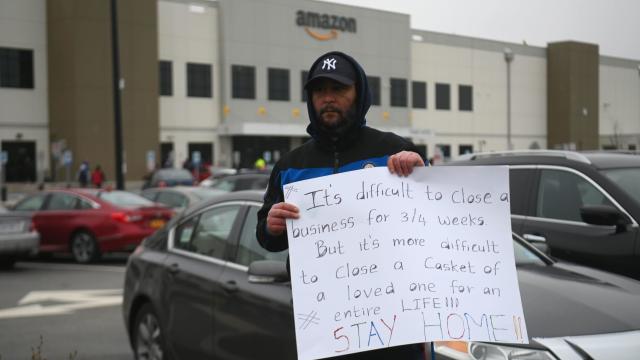On Monday, the Washington Post broke the story that Amazon fired two employees who have been at the forefront of an internal push for the company to address the climate crisis. More recently, they and other Amazon tech employees have pushed the company to take better care of its warehouse workers on the frontlines of the coronavirus pandemic.
Even before the pandemic, Amazon amended its rules to make it harder for employees to talk to the press and threatened to fire Maren Costa and Emily Cunningham, the two employees it has now officially let go. The last straw, according to reporting from the New York Times, appears to be Costa and Cunningham’s decision to participate in a virtual town hall for warehouse and office employees to chat about the conditions in warehouses.
Was Amazon within its rights? Sure. But the whole episode has laid bare that we have entered a new era of class struggle where a livable planet is at stake.
[referenced url=” thumb=” title=” excerpt=”]
Amazon Employees for Climate Justice, the group of more than 8,700 tech workers of which Costa and Cunningham were among the leaders, has pushed the company to adopt more proactive climate policies, stop taking fossil fuel contracts, and decarbonize its supply chain, all of which would have knock-on effects given it status as a commercial titan. The group also called for fair treatment of all workers during climate shocks in an open letter to Amazon’s board published exactly a year to the day from when Costa and Cunningham were fired.
The coronavirus has offered up a different type of shock, one that left warehouse workers crowded into fulfillment centres as essential employees. In response, those workers staged protests and asked for the barest of minimum safety measures to lower the risk of coming down with the coronavirus that has led to at least 21,000 deaths in the U.S. so far. Amazon Employees for Climate Justice stood in solidarity with warehouse workers.
And if there’s one thing that rich folks hate, it’s worker solidarity. Keeping people divided is essential to maintaining control and maximizing profits. It may seem like warehouse workers making $US15 ($23) per hour and Amazon tech employees pulling what are likely six-figure salaries isn’t exactly a match made in class solidarity heaven. But the climate and coronavirus crises have created unprecedented shocks that are rearranging society.
I don’t mean to equate the relative comfort that earning six figures affords you with the more tenuous livelihoods of warehouse workers. Clearly the latter face greater risks from both crises. But the gap between the way climate change and the coronavirus affect a UX designer and a warehouse worker is a lot smaller than the one between a UX designer and Jeff Bezos, who pulls in nearly $US9 ($14) million an hour. The climate crisis is ultimately a struggle pitting us vs. the billionaire—a struggle more people are waking up to. Rich folks’ rapacious response to the coronavirus and attempts to divide people may have just ended up speeding the process.
The stress of the coronavirus crisis has brought workers together in an alliance that would’ve seemed unlikely even a few years ago, one that also threatened Amazon’s lax approach to climate once the coronavirus pandemic eases. So for the radical act of caring for the wellbeing of their fellow humans, Costa and Cunningham were fired in the middle of a damn pandemic much like Chris Smalls, the Amazon warehouse worker who helped organise the fight for coronavirus protections (I look forward to getting a truculent email from Amazon’s PR trying to lay out the real reason and full facts.).
More than solidarity, it’s caring about human well-being that’s the biggest threat to Amazon and the hegemonic corporations that profit off destroying the planet. The climate crisis requires us to treat each other better, to understand the risks we face and protect those that are most vulnerable. That flies in the direct face of a company like Amazon, which is focused on creating a frictionless system to deliver our every need to our doorstep as soon as possible while shielding us from the brutal human toll that comes with such actions as well as the damage it does to the climate.
Amazon Employees for Climate Justice and striking warehouse workers each pull back the curtain. And in forging a bond, they show a better world is possible. And that’s the last thing billionaires want.
